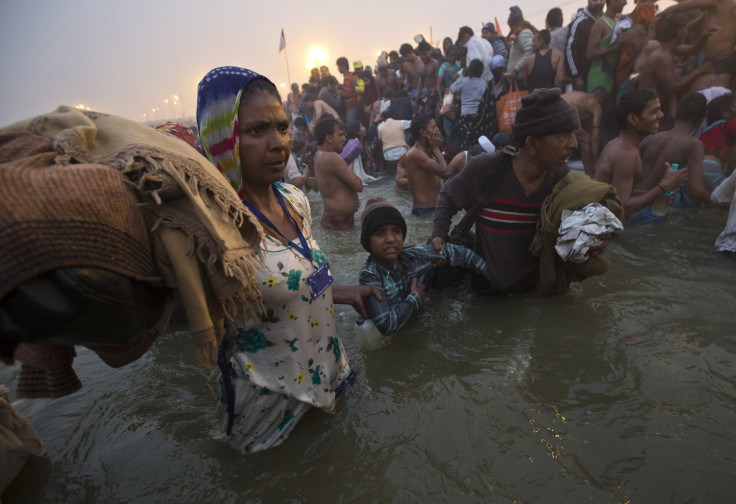Maha Kumbh Mela 2013: Scores Of Pilgrims Go Missing; 'Lost And Found' Centers Flooded With Requests To Locate Missing Devotees

The Maha Kumbh Mela, the holy festival of Hindus began Jan.14, 2013, at Prayag, Allahabad, and witnessed unprecedented crowd visiting the pilgrim site. The mad rush has separated several thousands of people from their families. Recent reports suggest that over 275,000 people are missing at the Maha Kumbh Mela even as the administration and volunteers take full efforts to find and reunite the missing persons.
The Maha Kumbh Mela – identified as one of the most spectacular shows of faith – observed once in 12 years, lasts for 55 days. An estimated 110 million people are expected to take a holy dip during the period. The auspicious occasion of Mauni Amavasya, observed Feb. 10 saw nearly 35 million pilgrims take part in the Maha Kumbh Mela.
Given the huge number of people gathering from the world over and from myriad cultures at the pilgrim site, the incidents of people getting lost in the crowd are also high. About 15,000 people were reportedly separated from their families Sunday, and the authorities are witnessing huge rush of people desperately searching for their loved ones in the lost and found centers at Prayag.
“We have lost count after 12,000 who were reported missing since 4 a.m. this morning,” Ashish Mishra, a civil defence volunteer told Gulf News, Sunday. “But we believe that around 15,000 people may have been reported missing,” said Mishra who volunteers at one of the lost and found center in Prayag. However, unofficial sources estimate nearly 97,000 have gone missing on the Mauni Amavasya day.
The government and the voluntary groups have set up several lost and found centers to help pilgrims locate the missing people, across Allahabad. Government in partnership with Datanet also launched a ‘lost and found’ online service for the pilgrimages to track the missing people and has announced mobile numbers, which people can call to report about missing and found persons.
The centers and the online service furnish a list of missing people along with their photos and details. Police officials are also announcing the names of missing and those found at the pilgrimage sites using loud speakers. All centers are flooded with people querying about their relatives. Many were seen crying, shouting the names of their husband, wife, brother, sister and children who got separated in the maddening rush. Thousands were seen carrying photographs and details of the missing persons at the site, CNN-IBN has reported.
These centers have reunited thousands of persons - most of them women, elderly and children - separated during Maha Kumbh Mela.
“While many missing women, children and elderly are eventually united with their families, several others who can’t locate their loved ones have to seek police help,” added Mishra.
Some centers also found toddlers and kids and had a tough time establishing the identity of the kids, for tracking parents and handing over the children.
The gathering with millions of people speaking different dialects with several thousands being illiterate and new to the area, increases chances of separation with rest of the group, which is the most likely consequence, volunteers pointed out.
“Most pilgrims are poor and illiterate who lose their sense of direction because of water on one side and millions of people on the other side,” Mishra said.
The Maha Kumbh Mela has its origins in the Hindu mythology. According to the legend, in a battle between the celestials and the demons for 'amruth' (the holy nectar of immortality), one of the Gods tricked the demons and ran off with the nectar to the celestials but not before spilling it in four places in India. They are identified to be Prayag, Ujjain, Haridhwar and Nashik. Maha Kumbh Mela is observed four times, every 12 years in these four destinations.
Legend has it that a dip in the holy river on the occasion of Maha Kumbh Mela will wash away the sins committed in present and previous births and help an individual to attain 'moksha' (salvation).
© Copyright IBTimes 2024. All rights reserved.






















